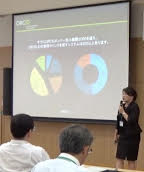Asia is culturally diverse and geographically widespread. Researchers in East Asian countries such as China, Korea, and Japan face a common challenge in author name disambiguation, exacerbated by transliteration into the Roman alphabet when publishing internationally. In China, the 100 most common last names are shared by over three-quarters of the country’s population. The distribution is even more skewed in Korea, where the five most common last names alone account for more than half of the population. Japanese last names are much more diverse, but share the same problem as China and Korea when it comes to transliteration. In each of these countries, ORCID is increasingly recognized as a much-needed solution to this problem, enabling researchers to correctly and unambiguously identify themselves.
So, after a two-year stint on the Communications Steering Group, I was delighted to accept the newly-created role of Regional Director for Asia-Pacific, enabled by a generous grant from the Helmsley Trust, to build capacity and engage with the increasing interest in ORCID in the region. My first three months have quickly passed by. It has been a very rewarding experience to work with my colleagues and with ORCID members in the region and I’m happy to share this report on progress towards increased ORCID adoptions in the research community and institutions in Asia-Pacific.
 My first ORCID talk was for the STM / CAST Training Day in Beijing in late August, in which I reported recent cases of authorship and peer-review misconduct, and how ORCID is being integrated to help restore academic trust in the publishing workflow. It was great to see so many journal editors and publishers in China, all with a shared enthusiasm for ORCID. During my short stay in Beijing, I also stopped off at the National Science Library of the Chinese Academy of Science for an update on their iAuthor project, as well as visiting a few other institutions planning to join as ORCID members in the near future. On my way back, I paid a quick visit to Seoul, where XMLink is integrating ORCID to enable author-based search in Synapse, a digital archive of Korean medical journals.
My first ORCID talk was for the STM / CAST Training Day in Beijing in late August, in which I reported recent cases of authorship and peer-review misconduct, and how ORCID is being integrated to help restore academic trust in the publishing workflow. It was great to see so many journal editors and publishers in China, all with a shared enthusiasm for ORCID. During my short stay in Beijing, I also stopped off at the National Science Library of the Chinese Academy of Science for an update on their iAuthor project, as well as visiting a few other institutions planning to join as ORCID members in the near future. On my way back, I paid a quick visit to Seoul, where XMLink is integrating ORCID to enable author-based search in Synapse, a digital archive of Korean medical journals.
Coming back to Japan, I attended the first annual conference of RMAN-J (Research Manager and Administrator Network Japan) on September 1-2 in Nagano where, courtesy of Media Fusion, I gave a short presentation on ORCID adoptions in Asia and worldwide.
I am off to Singapore next week to attend ARMS 2015, where I will overview how ORCID identifiers are being adopted in research evaluation workflows. And I’m excited to announce that we will be holding our first ORCID workshop in Taiwan on October 22, hosted by local ORCID member, the National Taiwan Normal University.
On the adoption front, we were delighted to welcome two new ORCID members in Asia in recent weeks. In August, the Hong Kong Institutes of Education Library joined five other universities in Hong Kong that are already integrating ORCID identifiers in their researcher directories. Many of these are connecting with other identifiers such as Scopus Author ID and Thomson Reuters’ ResearcherID. Following this trend, our other new member in the region, the National Institute for Materials Science, became the first organization in Japan to integrate ORCID into their researcher directory. All these institutions are helping to maintain ORCID records on behalf of their affiliated researchers as they make progress in their academic career.
I will be attending more conferences and meetings in the region over the coming months and look forward to meeting many more ORCID supporters!
Coming soon: news on ORCID consortia in the Asia-Pacific region.
